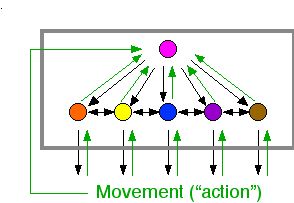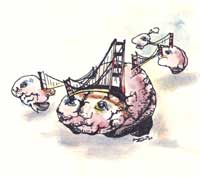Remote Ready Biology Learning Activities has 50 remote-ready activities, which work for either your classroom or remote teaching.
Serendip is an independent site partnering with faculty at multiple colleges and universities around the world. Happy exploring!


|
Welcome to the home page of Biology 202 at Bryn Mawr College. Pleased to have you here. I'm looking forward to an interesting,enjoyable, productive semester of "getting it progressively less wrong", and hope you are too. Let's have some fun, and see what we can all make out of it together.
Students (and visitors) should be aware that this is a "non-traditional" science course in several respects (see Science as Story Telling in Action for further background) |
 
Literary and historical starting points
The Brain - is wider than the Sky -
The Brain is deeper than the sea -
The Brain is just the weight of God - Emily Dickinson (1830-1886)
|
The course is organized in relation to the following general presumptions (see syllabus for specifics):
|
Course Lecture/Discussion Notes (click here for most recent)
2007 web papers Some Literary and Historical Starting Points Course Evolving Web Resource List Neurobiology and Behavior Resources on Serendip Mental Health Resources, from Serendip and the Center for Science in Society
|
Browse around. Get a sense of what's here, and how it does (or doesn't) relate to
things you might be interested in. Look for things that surprise you, cause you to think differently (rather than things that are what you expect, support the ways you already think). Think about what you think you know about brain
and behavior, and why, and what puzzles you, and why (what IS "thinking"? and what's it good for?). And expect to be wrong, over
and over again. That's the best starting place ... for any kind of scientific
inquiry. And the best way starting place for the productive sharing of ideas with others as well.
Some recent and ongoing conversations you might find interesting and, perhaps, want to participate in ...
The Novelist and the Neurobiologist
The Art Historian and the Neurobiologist
The Psychoanalyst and the Neurobiologist
Exploring Mental Health
A Working Group on Elementary Science Education
A directory of first web papers is now available.
An invitation to join the SciSoc working group on mental health ... Next meeting is this Sunday.
20 March
Interesting article on time sense in animals in NYTimes Science Times today.
April 10
Final web paper and book commentary due on line and in hard copy (in box outside Room 106) 5 pm Friday May 11 (seniors), noon Friday May 18 (others)
Pay one last visit to the forum area and tell us/others where you've come to on the idea that brain = behavior after a semester of playing with it?
| Forum | Brain and
Behavior | Serendip Home |